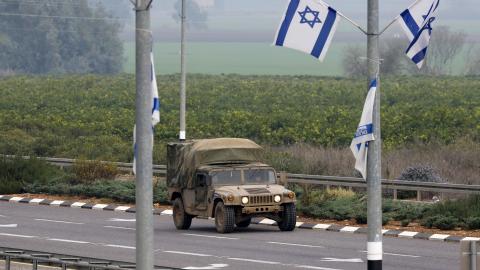While a debate rages around how to deal with remaining Hamas fighters in Rafah, northern Israel is under fire. Thirty rockets fell on Kiryat Shemona in April when I visited several villages along Israel’s border with Lebanon. The next day Hezbollah launched another 70 rockets on these border towns, which are nearly all deserted as the result of an Israeli evacuation order. These attacks are clear violations of UN Security Council Resolution (UNSCR) 1701 and are a testament to the failures of the UN and Lebanese forces to impose its terms. It is also clear that there will be no peace in Northern Israel or Southern Lebanon unless Israel takes enforcement of the resolution into its own hands.
In August of 2006 the Lebanese cabinet unanimously agreed to adhere to UNSCR 1701 calling for the removal of forces south of the Letani River and a disarmament of Hezbollah. Days later, Israel similarly agreed to honor the resolution and pull all Israeli Defense Forces (IDF) from Lebanon. 18 years later not only does Hezbollah rule the entire area south of the Letani, it has grown considerably in size and strength. The U.S. designated terrorist organization is now a fully equipped army with more munitions and weapons than many medium size nations. Hezbollah boasts of over 200,000 missiles positioned south of the Letani River all pointing at Israeli cities and towns. Since October 7th Hezbollah has fired over 3,500 of those missiles, killing Israeli civilians and soldiers alike.
In Israel, the citizens of the towns under fire are courageously optimistic. Orna, a middle-aged Israeli woman from the small town of Menara, told me she will return to her home—the only one she’s ever known—as soon as the IDF allows. Proudly displayed on the dining room wall is a black and white photograph of her older sister sitting atop the rock where her Kibbutz was founded in 1944 on the Lebanese, Israeli border. Sitting beside her sister there’s another young girl in this image: a girl who now a grandmother whose two children and grandchild were murdered by different Iranian funded terrorists, Hamas, on October 7th in Southern Israel. The picture, Orna says, fills her with determination to reclaim her home and honor her family.
Outside the main dining hall of the kibbutz in Menara is a damaged sukkah, still partially standing. The attacks that began on October 7th fell at the end of the Sukkot holiday, and the evacuation that followed prevented the town’s inhabitants from venturing outside to take it down. Frederieke, a mother of three who had lived in a hotel with her two youngest children for four months before settling on another kibbutz, told me the broken sukkah is a representation of her heart during this war: damaged, but still standing. One day she will mend it and once again welcome the friends she misses so dearly inside it for holiday celebrations. Like the sukkah, Frederieke assures me, this living situation is only temporary.
Menara is like many towns across Northern Israel. Rockets, mortars, and anti-tank munitions have pummeled civilian areas; whenever there is movement in the village a rocket attack is likely to follow. Each attack reflects the impotence of UN peace keeping force there, known as UNIFIL. Current and former IDF leaders I spoke with in the North are committed to protecting Israelis no matter the cost. Yet the international community has made no reference to UNSCR 1701, the obligation to enforce the disarmament of Hezbollah, or the removal of forces south of the Letani.
From the scenes unfolding in the north, a picture develops of UN that has either entirely abandoned its responsibilities under 1701 or is complicit in Hezbollah attacks. The IDF have documented, often with video evidence, nearly two dozen attacks originating from within 100 meters of UN buildings in southern Lebanon. Several from within the UN compounds. Other attacks have come from mosque courtyards and schools, violating international law. UNIFIL has either become a robustly funded group of notetakers enabling Hezbollah’s violence or entirely sympathetic to the Hezbollah cause.
Without UNIFIL, there are only two forces left to enforce the disarmament of Hezbollah: The Lebanese Armed Forces (LAF) and the IDF. Despite $4 billion in U.S. aide to the LAF, U.S. military leaders close to the issue state behind closed doors that the LAF are incapable of taking on Hezbollah and would be unwilling if asked. This leaves the IDF as the only viable option and places a responsibility on other UNSC members to support them in enforcing the resolution set forth in 2006. As the clearing of Hamas from Gaza is nearing an end and Israel will look to its northern border next. The U.S. along with other Security Council members, should stand up and demand enforcement of 1701. When the UN fails to act, the U.S., UK, and France must provide Israel the support it needs to clear a buffer zone large enough to protect its civilians from harm.



















